The following timeline traces the house's amazing publishing record and the course
of its anti-censorship battles.
1951: Barney Rosset publishes three neglected masterworks: The Confidence-Man by Herman Melville, The Verse in English of Richard Crashaw
by Richard Crashaw and Selected Writings
of the Ingenious Mrs. Aphra Behn by Aphra Behn.
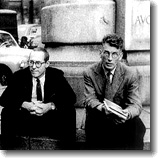 1954: Waiting for
Godot by Samuel Beckett is published.
1954: Waiting for
Godot by Samuel Beckett is published.
1957: First issue of Evergreen
Review, Grove's literary magazine, is published.
1958: Subterraneans
by Jack Kerouac is published.
1959: Grove publishes Lady
Chatterley's Lover by D.H. Lawrence, which is promptly deemed obscene by
the federal government. Grove challenges the decision and wins on the grounds
that the book's literary merit justifies publication.
Barney Rosset publishes the 30-page ruling against U.S.
Postal Service and in favor of Grove Press in Evergreen Review No. 9
1960: The Zoo Story
by Edward Albee is published in the Evergreen
Review.
1961: Tropic of Cancer
by Henry Miller is published, but publication is stopped due to obscenity
charges.
1962: Ficciones by
Jorge Luis Borges is published.
1962: Naked Lunch
by William S. Burroughs is published and challenged on grounds of obscenity.
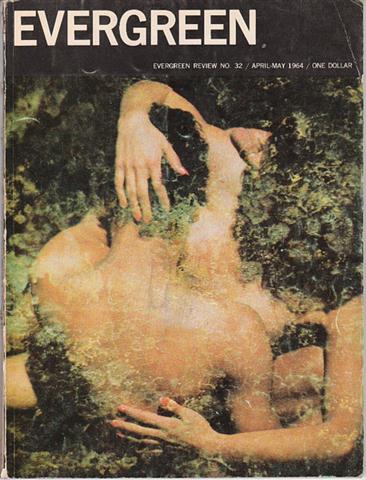 Evergreen Review
No. 32 launches as a glossy, visually oriented magazine. Detectives from Nassau
County's Vice Squad raid the printing plant on Long Island and carry off 21,000
unbound copies of the issue.
Evergreen Review
No. 32 launches as a glossy, visually oriented magazine. Detectives from Nassau
County's Vice Squad raid the printing plant on Long Island and carry off 21,000
unbound copies of the issue.
1963: City of Night
by John Rechy is published.
1964: The Thief's
Journal by Jean Genet is published.
Last Exit to Brooklyn
by Hubert Selby, Jr. is published.
The U.S. Supreme Court allows the unobstructed publication
of Tropic of Cancer.
1965: Four Novels
by Marguerite Duras is published.
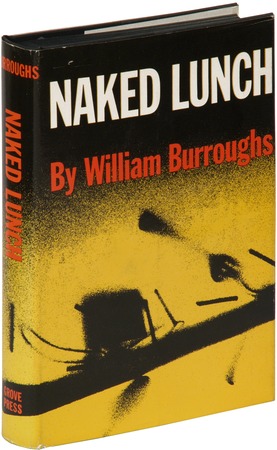 The Supreme Court of Massachusetts rules that Naked Lunch is not obscene, echoing a
1965 ruling in California, the site of the only other action against the book.
The Supreme Court of Massachusetts rules that Naked Lunch is not obscene, echoing a
1965 ruling in California, the site of the only other action against the book.
1967: Rosencrantz and
Guildenstern Are Dead by Tom Stoppard is published.
1968: Bolivian Diaries
by Che Guevara is published.
The Wretched of the
Earth by Frantz Fanon is published.
1969: Samuel Beckett receives the Nobel Prize in Literature.
A Personal Matter
by Kenzaburo Oe is published.
1971: Pablo Neruda receives the Nobel Prize in Literature.
1974: Five Decades
by Pablo Neruda is published.
1975: Barney Rosset writes letter for financial help to the New York Times.
1977: American Buffalo
by David Mamet is published.
Journals: Early
Fifties, Early Sixties by Allen Ginsberg is published.
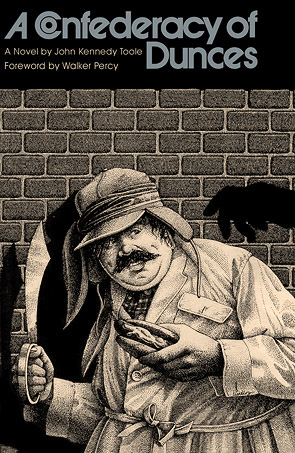 1981: John Kennedy Toole wins Pulitzer Prize for A Confederacy of Dunces.
1981: John Kennedy Toole wins Pulitzer Prize for A Confederacy of Dunces.
1984: Blood and Guts
in High School by Kathy Acker is published.
1985: Hurlyburly
by David Rabe is published.
1987: Penelope Lively wins the Booker Prize for Moon Tiger.
Oranges Are Not the
Only Fruit by Jeanette Winterson is published.
1988: Bharati Mukherjee receives the National Book Critics
Circle Award for The Middleman and Other
Stories.
1989: Camilo José Cela receives the Nobel Prize in
Literature.
1990: Octavio Paz receives the Nobel Prize in Literature.
Ron Chernow receives the National Book Award for The House of Morgan.
1992: Francisco Goldman is a finalist for the PEN/Faulkner
Award for The Long Night of White Chickens.
1993: Grove Press merges with Atlantic Monthly Press to form
Grove/Atlantic, Inc.
Kitchen by Banana
Yoshimoto is published.
1994: Kenzaburo Oe receives the Nobel Prize in Literature.
1995: 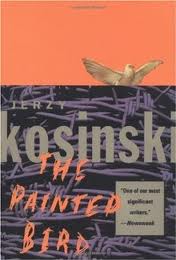 The Painted Bird
by Jerzy Kosinski is reissued in a Grove paperback.
The Painted Bird
by Jerzy Kosinski is reissued in a Grove paperback.
1996: The Magic
Christian by Terry Southern is reissued in a Grove edition.
Sex and the City
by Candace Bushnell is published.
1997: Dario Fo receives the Nobel Prize in Literature.
Great Apes by Will
Self is published.
Che Guevara by Jon
Lee Anderson is published.
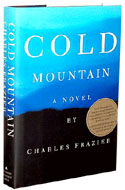 Charles Frazier receives the National Book Award for Cold Mountain.
Charles Frazier receives the National Book Award for Cold Mountain.
Valley of the Dolls
by Jacqueline Susann is reissued.
1998: Sarah Lindsay is a National Book Award finalist for Primate Behavior.
1999: Mark Bowden is a National Book Award finalist for Black Hawk Down.
2003: Richard Flanagan receives the Commonwealth Prize for Gould's Book of Fish.
Charlie Wilson's War
by George Crile is published.
2004: Elfriede Jelinek receives the Nobel Prize in
Literature.
Black Cat imprint revived.
2005: Harold Pinter receives the Nobel Prize in Literature.
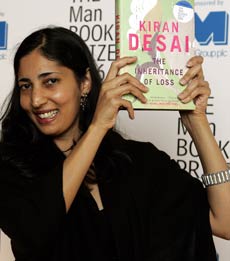 2006: Kiran Desai wins the Man Booker Prize for The Inheritance of Loss.
2006: Kiran Desai wins the Man Booker Prize for The Inheritance of Loss.
2007: Anne Enright wins the Man Booker Prize for The Gathering.
Man Gone Down by
Michael Thomas is published.
2008: Kay Ryan appointed the Library of Congress's 16th Poet
Laureate Consultant in Poetry.
2009: Michael Thomas received the International Dublin/IMPAC
Literary Award for Man Gone Down.
Steve Hely receives the Thurber Prize for American Humor for
How I Became a Famous Novelist.
 2010: Sherman Alexie wins the PEN/Faulkner Award for War Dances.
2010: Sherman Alexie wins the PEN/Faulkner Award for War Dances.
 This year Grove/Atlantic celebrates the 60th anniversary of Grove Press. Here, with the support of the publisher, Shelf Awareness celebrates by focusing on three spring titles of an especially strong list: Say Her Name by Francisco Goldman, Turn of Mind by Alice LaPlante and Here on Earth by Tim Flannery.
This year Grove/Atlantic celebrates the 60th anniversary of Grove Press. Here, with the support of the publisher, Shelf Awareness celebrates by focusing on three spring titles of an especially strong list: Say Her Name by Francisco Goldman, Turn of Mind by Alice LaPlante and Here on Earth by Tim Flannery.







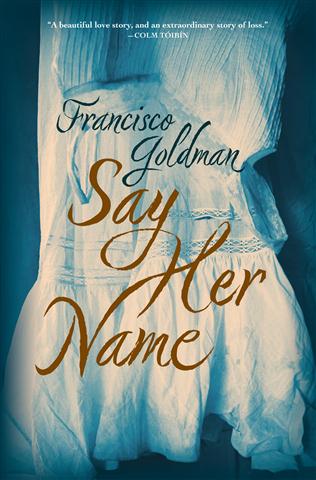 Say Her Name "was my way of mourning Aura, to make sure she would never be forgotten--not by me or by anyone else," explained Francisco Goldman about the inspiration for his new novel.
Say Her Name "was my way of mourning Aura, to make sure she would never be forgotten--not by me or by anyone else," explained Francisco Goldman about the inspiration for his new novel.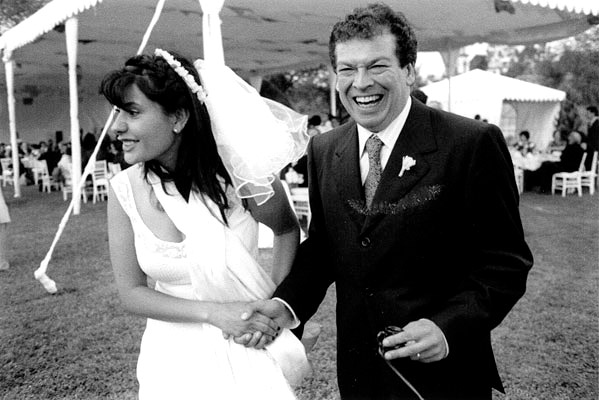 Goldman began writing Say Her Name five months after Aura's death and worked on it for three years. "Writing is my way to process things," he said. "I had no choice but to write this book. I always say that if I had been a mountain climber, after Aura's death I would have tried to climb the highest mountain. You deal with these things by relying on what you know how to do."
Goldman began writing Say Her Name five months after Aura's death and worked on it for three years. "Writing is my way to process things," he said. "I had no choice but to write this book. I always say that if I had been a mountain climber, after Aura's death I would have tried to climb the highest mountain. You deal with these things by relying on what you know how to do."
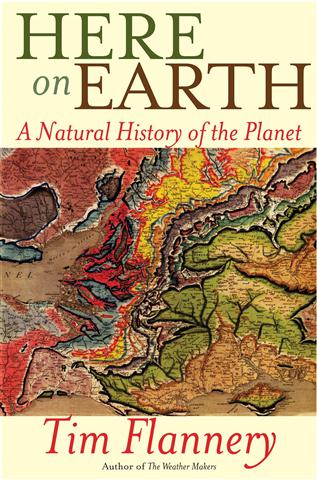 Here on Earth: A Natural History of the Planet is "a twin biography--of our planet and our species--and a distillation of all I've learned as an evolutionary biologist," Tim Flannery said of his latest book, which will be published in the U.S. in April. In the book, Flannery, a world-renowned scientist, discoverer, environmental activist and author of The Weather Makers, posits that "humans and the earth system co-evolve in ways analogous to ecosystems and bodies," a co-evolution that is key to a sustainable future.
Here on Earth: A Natural History of the Planet is "a twin biography--of our planet and our species--and a distillation of all I've learned as an evolutionary biologist," Tim Flannery said of his latest book, which will be published in the U.S. in April. In the book, Flannery, a world-renowned scientist, discoverer, environmental activist and author of The Weather Makers, posits that "humans and the earth system co-evolve in ways analogous to ecosystems and bodies," a co-evolution that is key to a sustainable future.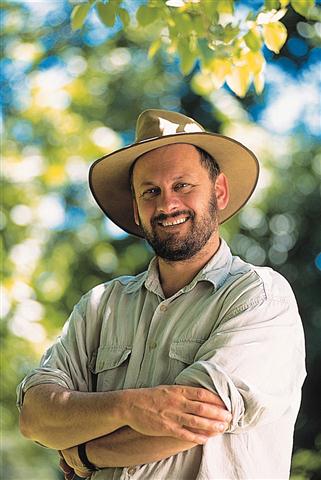 Flannery has dedicated his extraordinary mind to influencing the debate about climate change, particularly in his homeland. Recently named Australia's Chief Climate Commissioner (he was Australian of the Year in 2007), his first task, he said, is to engage Parliament in a discussion about climate change, in which he hopes "to try to find some common ground." The record in Australia over the past three years should help convince those who doubt climate change, he said. The country has "suffered through its longest drought on record, most severe and deadly brushfire, most damaging floods and its largest cyclone in living memory. Such events should act as a sobering reminder of the kinds of cost and human tragedy involved should greenhouse gas concentrations continue to increase."
Flannery has dedicated his extraordinary mind to influencing the debate about climate change, particularly in his homeland. Recently named Australia's Chief Climate Commissioner (he was Australian of the Year in 2007), his first task, he said, is to engage Parliament in a discussion about climate change, in which he hopes "to try to find some common ground." The record in Australia over the past three years should help convince those who doubt climate change, he said. The country has "suffered through its longest drought on record, most severe and deadly brushfire, most damaging floods and its largest cyclone in living memory. Such events should act as a sobering reminder of the kinds of cost and human tragedy involved should greenhouse gas concentrations continue to increase."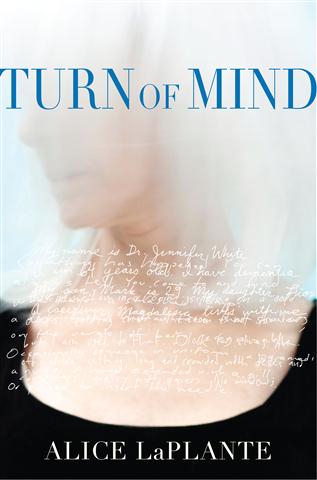 While watching an episode of a BBC
television show featuring Sherlock Holmes, creative writing instructor Alice
LaPlante's partner asked her if she would consider writing a mystery. Rather
than tell a story from a detective's viewpoint, "I thought I could better
imagine my way into the suspect's mind," said LaPlante. That night she
wrote the opening scene of her debut novel, Turn
of Mind, which will be published in July.
While watching an episode of a BBC
television show featuring Sherlock Holmes, creative writing instructor Alice
LaPlante's partner asked her if she would consider writing a mystery. Rather
than tell a story from a detective's viewpoint, "I thought I could better
imagine my way into the suspect's mind," said LaPlante. That night she
wrote the opening scene of her debut novel, Turn
of Mind, which will be published in July.  Grove/Atlantic's spring/summer list is "one of the best we've ever had," president and publisher Morgan Entrekin said. "Every publisher tries to have a list like this, but things are not always under our control, and sometimes it just happens." Noting the "incredible support" that Matterhorn received a year ago at the 2010 ABA Winter Institute and that Say Her Name and Turn of Mind received last month at this year's Winter Institute, Entrekin joked, "I'm not sure what we're going to do in 2012."
Grove/Atlantic's spring/summer list is "one of the best we've ever had," president and publisher Morgan Entrekin said. "Every publisher tries to have a list like this, but things are not always under our control, and sometimes it just happens." Noting the "incredible support" that Matterhorn received a year ago at the 2010 ABA Winter Institute and that Say Her Name and Turn of Mind received last month at this year's Winter Institute, Entrekin joked, "I'm not sure what we're going to do in 2012."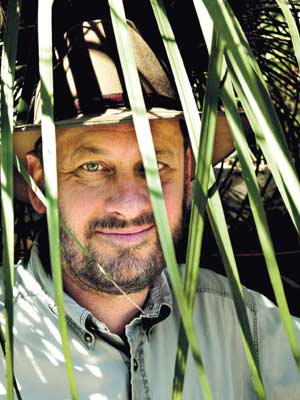 Tim Flannery is a
writer, scientist and explorer. He has written many award-winning books,
including The Future Eaters, Thowim
Way Leg and Country. His 2005 The Weather Makers became an international
bestseller. He is a member of the Wentworth Group of Concerned Scientists, the
National Geographic Society's Australasian representative and a director of the
Australian Wildlife Conservancy. In January 2007, Flannery was named
Australian of the Year, and in February 2011 he was named Australia's first Chief Commissioner for
climate change.
Tim Flannery is a
writer, scientist and explorer. He has written many award-winning books,
including The Future Eaters, Thowim
Way Leg and Country. His 2005 The Weather Makers became an international
bestseller. He is a member of the Wentworth Group of Concerned Scientists, the
National Geographic Society's Australasian representative and a director of the
Australian Wildlife Conservancy. In January 2007, Flannery was named
Australian of the Year, and in February 2011 he was named Australia's first Chief Commissioner for
climate change.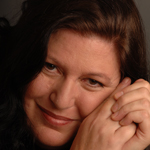 Alice LaPlante teaches at San Francisco State University and Stanford
University, where she was awarded a Wallace Stegner Fellowship and held a Jones
Lectureship. Raised in Chicago, she now lives with her family in Northern
California.
Alice LaPlante teaches at San Francisco State University and Stanford
University, where she was awarded a Wallace Stegner Fellowship and held a Jones
Lectureship. Raised in Chicago, she now lives with her family in Northern
California. 1954: Waiting for
Godot by Samuel Beckett is published.
1954: Waiting for
Godot by Samuel Beckett is published. Evergreen Review
No. 32 launches as a glossy, visually oriented magazine. Detectives from Nassau
County's Vice Squad raid the printing plant on Long Island and carry off 21,000
unbound copies of the issue.
Evergreen Review
No. 32 launches as a glossy, visually oriented magazine. Detectives from Nassau
County's Vice Squad raid the printing plant on Long Island and carry off 21,000
unbound copies of the issue. The Supreme Court of Massachusetts rules that Naked Lunch is not obscene, echoing a
1965 ruling in California, the site of the only other action against the book.
The Supreme Court of Massachusetts rules that Naked Lunch is not obscene, echoing a
1965 ruling in California, the site of the only other action against the book. 1981: John Kennedy Toole wins Pulitzer Prize for A Confederacy of Dunces.
1981: John Kennedy Toole wins Pulitzer Prize for A Confederacy of Dunces. The Painted Bird
by Jerzy Kosinski is reissued in a Grove paperback.
The Painted Bird
by Jerzy Kosinski is reissued in a Grove paperback. Charles Frazier receives the National Book Award for Cold Mountain.
Charles Frazier receives the National Book Award for Cold Mountain. 2006: Kiran Desai wins the Man Booker Prize for The Inheritance of Loss.
2006: Kiran Desai wins the Man Booker Prize for The Inheritance of Loss. 2010: Sherman Alexie wins the PEN/Faulkner Award for War Dances.
2010: Sherman Alexie wins the PEN/Faulkner Award for War Dances.